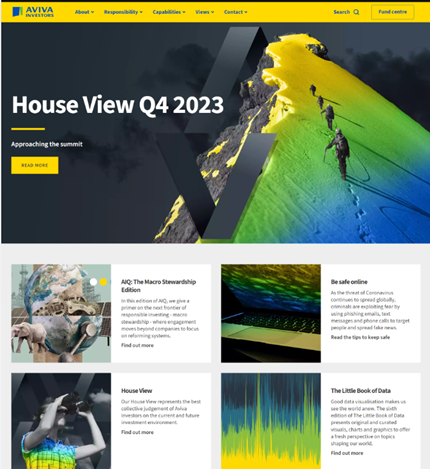As we look forward to 2024, a pivotal question arises for brands seeking to distinguish themselves and elevate their brand image: will the era of plain stock imagery soon become a thing of the past?
In the ever-evolving landscape of brand representation, the quest for distinctive and unique imagery takes centre stage. 65% of the population are visual learners, meaning visuals have a profound impact on memory and how individuals perceive brands. Giving your audience the power to visualise your brand through images that are relevant and engaging can be just as important as the content that accompanies them.
The Financial Times recently published an article on the pervasive use of stock imagery within financial institutions, highlighting its shortcomings in conveying a clear visual narrative. As marketers, I’m sure we have all faced the challenge of finding that perfect image, often struggling to translate complex ideas into visually compelling representations.
Additionally, the overuse of generic stock images, such as those conveying sustainable investing concepts or consisting of generic financial charts, only exacerbates this issue.
In a market saturated with content, with an avalanche of marketing collateral appearing daily, the burning question emerges: how do you make your brand’s imagery stand out? From our research into the top 50 asset managers, we discovered that 82% of asset managers use photography, with stock imagery of people and landscapes being the most common form of imagery within this category.
Amid this sea of stock imagery, there are multiple ways to make your brand imagery stand out. Here are some of our favourites:
Visual overlays:
Utilising your brand palette as a colour overlay is one way to make your images more distinctive. Not only does it make your assets stand out, but it also reinforces your brand colour palette and can be an easy way for clients to recognise your brand.
Aviva Investors does this particularly well, using treated images with colours that align with their palette to result in a striking, rich and memorable visual experience.

Illustration:
Another way to move away from stock imagery is to create illustrations that are more personal and creative.
BNP Paribas Asset Management has successfully harnessed the power of illustration, which it pairs with vibrant, bold images to carve out a distinctive niche for its brand. This unique illustrative style not only adds an individualised flair but also reinforces the core sustainability focus of the brand.

The future of distinctiveness: AI generated images
In the evolving landscape of artificial intelligence, asset management marketers have an opportunity to break free from conventional stock imagery by exploring the realm of AI generated images.
Platforms like Midjourney and Runway offer a user-friendly avenue to translating text prompts into visually engaging and intricate images. What sets these platforms apart is their ability to not only produce exclusive visuals but also animate them with a click, transforming static images into dynamic narratives.
While this approach is relatively new and still has some way to go before it is fully adopted by marketers, it has the ability to provide unique visuals while bypassing the logistical challenges typically associated with traditional photoshoots.
Bespoke photoshoot content undoubtedly retains its value, AI-generated images offer a swift alternative with enhanced creative expression, eliminating the potential cost, coordination and administrative hurdles.
As this is a relatively new concept, laws and rules around image use are still evolving so it’s important to check usage and rights ahead of developing an image.
Conclusion:
In the ever-evolving visual landscape, the integration of AI-generated images, coupled with creative strategies, unveils a path toward creating images that are unique. While there will always be challenges, the rewards are abundant – timely image creation, creative freedom and a visual identity that transcends the mundane.
As we navigate this transformative era, the key lies in embracing innovation, staying attuned to legal developments and crafting a visual narrative that resonates in the minds of audiences, ushering brands into a new era of creative expression.
If you want to learn more about follow this link to read our brand research case study, or reach out to us to discuss your brand distinctiveness today.
